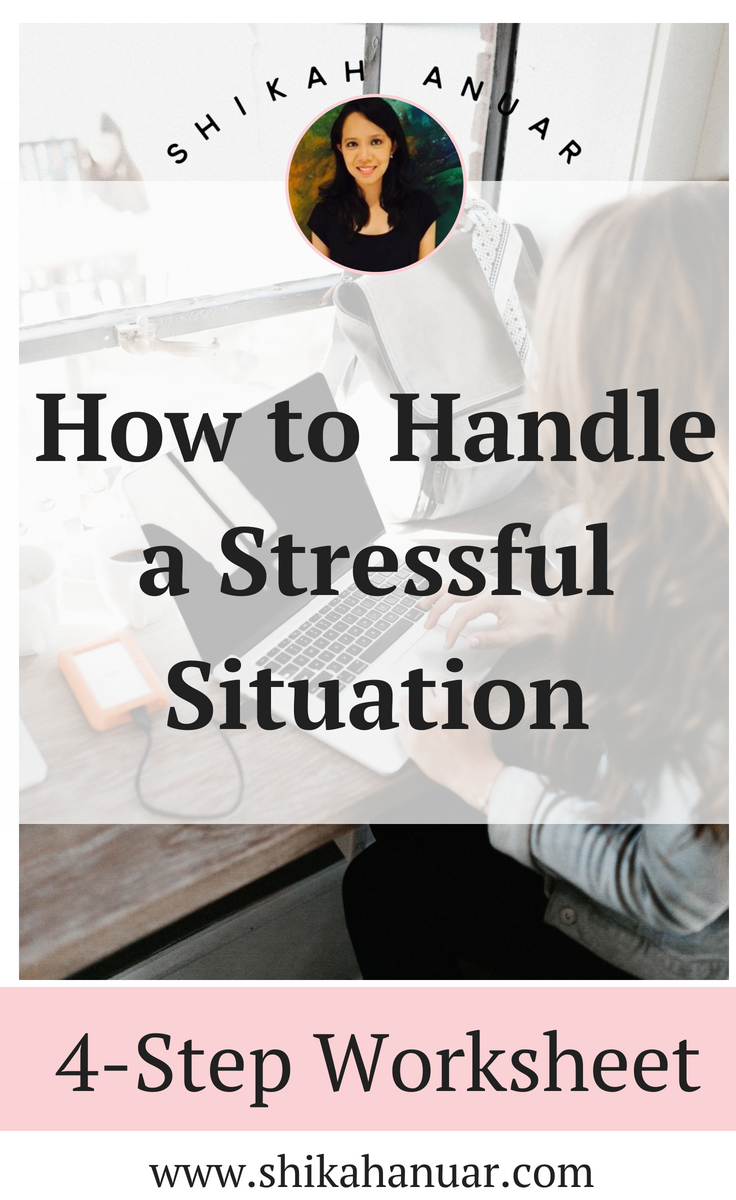(Free Printable) 5 Powerful Habits for Self Love
Self-love is about respecting our wants, our values and creating boundaries for our own good.
It’s not obvious, but many of us women lack self-love.
We can’t switch to being a self-loving person in a snap, but I have a ‘Love Your Quirks’ worksheet which helps you to re-frame, or rather, see how your ‘weaknesses’ can be helpful for you. :)
Self love is not selfish.
Self-love is about respecting our wants, our values and creating boundaries for our own good.
For some of us, we were taught to respect other people, but not to respect ourselves.
This leads to self-sacrificing behaviour, confusion about our own likes and dislikes, and much unhappiness.
We can’t switch to being a self-loving person in a snap, but I have a ‘Love Your Quirks’ worksheet which helps you to re-frame, or rather, see how your ‘weaknesses’ can be helpful for you.
Here are the 5 habits for self-love:
Habit #1 : Be brave and say ‘no’
If you are a people-pleaser or a genuinely nice person, saying ‘no’ is usually difficult for you.
Heck, practising self love is also challenge for you!
If you feel that someone is trying to take advantage of you, you can use one of the 5 ways below to say no without offending (much).
*Here are 5 ways for you to say ‘no’ without offending.
I’m busy at the moment so I can’t help you with XXX.
I think we should do XXX ourselves.
I’m not comfortable doing XXX.
I can’t help you with XXX right now. Maybe next time.
No, not today. Sorry about that! (no explanation given)
*All the above can be said in a neutral or in a pleasant tone of voice.
Saying no builds self respect.
You are also protecting yourself from over-committing, burning yourself out, doing something you don’t want to do and feeling terrible about it.
Habit #2: Listen to your body
How do we ‘listen to our bodies’? We’ve heard this phrase so many times, but how do we do it daily for self love purposes?
Be aware of your bodily sensations.
If you are sleepy, take a nap. If you are hungry, eat. If you are thirsty, get a drink. If your eyes feel strained, take a break from your laptop. If your skin feels dry, slap on a sheet mask. If you feel like doing some stretching, do it. If you feel the need to talk to your husband, do so.
Catch the drift? :) The steps above are simple, but not always easy to do.
That is because many of us are used to suppressing or ignoring our bodily sensations.
When you are hungry, be present and find out what your body wants to eat today.
It can be as random as a peach or maybe you are drawn to a fast food meal at that time. As long as you are balanced when eating, your body can handle some fried food here and there.
If your body feels tired, rest. Many of us have a habit of ‘powering through’ our exhaustion.
This makes us unproductive. Feeling terrible (and looking terrible to boot).
Surprisingly, when you rest (make sure you clear your mind too - very important.), you will have more energy to complete your work later on.
You will finish your work in maybe half the time as compared to bulldozing through your exhaustion to get it done. You can bet that the work will be of better quality too.
Habit #3: Good vibes only
A HUGE part of self-love is being very selective about whom you accept in your social circle.
Surround yourself with positive people. How do you know if someone should be included in your circle?
If that person makes you feel good 90% of the time, he or she is a keeper.
I would like to add that you should only be friends with people who have healthy self-esteem. People with healthy self-esteem will support you and be happy for you when you succeed.
People with good self-esteem are usually transparent with their actions, words and feelings.
If you have ever doubted if a friend is happy for your success or not - that ‘friend’ might have to be kicked out of your circle soon.
And genuine friends don’t give ‘mixed signals’.
Get rid of frenemies, Debby Downers, complainers, backstabbers, toxic people, people who like breaking friendships and relationships, highly insecure people. (Don’t underestimate the toxicity level of a highly insecure ‘friend’.)
To put it lightly, these people will give you headaches and heartaches. We don’t have time for that!
Also….be sure that we are not one of those toxic people mentioned above! But that will be for another blog post for another time.
Habit #4: Don’t be so harsh on yourself
Forgive yourself.
Even your good friends and family don’t expect you to be perfect. Why should you?
Even the person you admire most has made many mistakes. Sometimes, we will accidentally say something which hurts someone else. We might do the wrong thing at the wrong time.
Learn something from those slip-ups, forgive yourself and move on.
Habit #5: Love your ‘weaknesses’
I’m sure you can come up with 3 of your weaknesses in 5 seconds flat.
As humans, we are programmed to focus on the negative aspects of something - which,sadly, includes focusing on the negative aspects of ourselves.
Embrace them as part of you. Admit that you are nervous about public speaking, you tend to procrastinate and so on.
I have a candid worksheet - ‘Love Your Quirks’ - which helps you view how your ‘weaknesses’ can be helpful in some situations.
For example: I am an over-thinker, thus I wrote down how overthinking has helped me in 2 situations.
If you have children, you can complete this worksheet with them as well. It helps them to re-frame how they view their own perceived ‘weaknesses’.
If you want a copy of this worksheet, you can download it below.
Have a good week!
Shikah
(Free Printable) How to Overcome Fear 1 Step at a Time
Use The Bravery Ladder method to help yourself (or a loved one) overcome fear 1 step at a time.
If you are a parent, your child can use this method to overcome fear of public speaking, speaking up in class and performing onstage, amongst others.
This method takes time though - it’s not a quick fix. But it’s a worthwhile journey!
Stress and fear trigger the fight-or-flight response in us.
It’s tempting to skip all situations which make us stressed or anxious.
However, this is not helpful. Whenever you are put in the same types of situation, the same anxiety and fear will creep up.
Avoiding a stressful or fearful situation will give us relief from feelings of anxiety and stress.
But, if we continue avoiding such situations, our brains will link avoidance with anxiety relief.
The result?
We continue avoiding those stressful or fearful situations for ALL of our lives.
How to use The Bravery Ladder to Overcome Fear Slowly
I have a mindset tool (The Bravery Ladder) which you can use.
Experts recommend 'graded exposure' which means, experiencing your stressful situations one baby step at a time.
For example: Let’s say Linda has a fear of public speaking. Let’s see how we can use ‘graded exposure’ using The Bravery Ladder method.
Ask Linda to write her LEAST FEARED activity at Level 1 leading all the way up to the MOST FEARED activity at Level 6 (which is public speaking).
You can look at the example below.
Linda can expose herself to the Level 1 activity first for 4-5 times a week.
Or until her anxiety about the Level 1 activity reduces to about 50%. Whichever comes first.
Then she will move on to the Level 2 activity (which is, giving a presentation in front of the sister). Similarly, she will do this 4-5 times a week or until her anxiety for this Level 2 activity dies down by 50%. Whichever comes first.
This will go on until she reaches Level 6.
As you can see, this method takes time. It's definitely not a quick fix.
The outcome for this tool is to confront stressful or feared situations gradually until feelings of stress and anxiety dip.
Now is your turn to share The Bravery Ladder to overcome your own fear.
I've created a blank The Bravery Ladder worksheet for you. You can download it below.
Hope it helps!
(Free Printable) How to Handle a Stressful Situation
I know there are some of us who ‘beat ourselves up’ when we make mistakes.
We get self-critical, unforgiving and start having unworthy thoughts when mistakes happen.
Hence, I’ve created a mindset worksheet here which helps you reframe your thoughts when you (or your child) experience something stressful.
I wrote this entry because I am surrounded by friends who are stressed.
My friends are working in high-flying jobs which take up a lot of their energy and time.
They have Sunday blues. Some go for short getaways almost every weekend to ‘escape’ the stress.
I know there are some of us who ‘beat ourselves up’ when we make mistakes.
We get self-critical, unforgiving and start having unworthy thoughts when mistakes happen.
I have a mindset worksheet here which helps you reframe your thoughts when you experience something stressful.
It’s helpful for that occasional time when you ‘screw up’, make mistakes and start having downward-spiralling thoughts.
4 Step-by-Step Actions to Handle a Stressful Situation
Our feelings are controlled by our thoughts.
To change unpleasant feelings to happier, more uplifting feelings, we need to change our thoughts.
How do we do that?
Not to worry, I’ve created the Pause Perfectionism Worksheet (click to download) to make it easier for you.
I named it Pause Perfectionism because self-critical thoughts are partly caused by perfectionism.
The above is an example of how to complete the Pause Perfectionism Worksheet.
You can download the Pause Perfectionism Worksheet below.
There are 4 sections to this worksheet and each section requires action from you.
Action Step 1: Pinpoint the Problem
What is the situation causing you to be self-critical?
You did not finish a project on time?
Your colleagues laughing or being critical of your idea during a meeting?
Your boss telling you your presentation was not up to standard?
Your client got angry because he or she was not satisfied with your work?
Your colleagues giving you ‘constructive feedback’ about your work?
Action Step 2: Acknowledge your Feelings about the situation
Be honest with yourself. (Don’t be in denial.)
Write down in the Feelings column if you feel ashamed, angry, hurt, vulnerable.
Some of us feel uncomfortable admitting that we feel ashamed and hurt.
If so, ask yourself: “Why am I uncomfortable admitting that I feel hurt/ embarrassed/ like a failure?”
Is it because you think admitting to your feelings is a sign of weakness?
On the contrary, it takes strength to be vulnerable in front of others and risk being seen as a wimp.
Action Step 3: What Self-critical Thoughts are causing those feelings?
Feelings are controlled by thoughts.
If you can reframe your thoughts, you can change your feelings. It sounds simple, but it’s not easy to do.
You have to dig deep and identify your perfectionistic thoughts linked to your feelings.
Write those self-critical thoughts in the Self-Critical Thoughts column.
For example:
“My superior thinks I’m lousy.”
“Can’t believe I’m making mistakes again. Very typical. Always making mistakes.”
“They didn’t give me that project because they don’t think I’m capable enough to handle it.”
“My superior praised me today because he was in a good mood - my work wasn’t that great.”
“I did my best, but it’s still not good enough. I’m incompetent. I think I’m the slowest worker in the office. Maybe my colleagues are talking about me behind my back! That is so embarrassing - I can’t face anyone like this.”
For me, I’ve always linked mistakes with being useless.
I was brought up thinking we have to be productive every single time, which is common for Asian cultures.
I hated being ‘useless’ or a deadweight anywhere.
I’ve come a long way in embracing my own self-worth which is still an ongoing journey for me.
But that’s another topic for another time.
Action Step 4: Replace those self-critical thoughts with New Forgiving Thoughts
Looking at matters from a big perspective helps.
If your boss said your presentation sucked, it could be that you were distracted by things happening in your personal life. Thus, you were not focused at work.
Or maybe you did a shoddy job because you were too busy to prepare the presentation at length. You said ‘yes’ to too many requests and had too much on your plate.
Maybe you did not get work done because you wanted it to be ‘perfect’. You were waiting for the ‘perfect’ time when you have all your materials ready before starting. Hence, you procrastinated.
It’s not because you are incompetent!
Or maybe...your boss was not in a good mood that day. ;)
Create new self-loving thoughts to replace those self-critical ones.
Some examples:
“Making mistakes is common. Even (insert competent colleague’s name) has made mistakes before. I can do a better job next time!”
“I’m being self-critical right now. Time to step back, take a few deep breaths and steady my thoughts.”
You should feel lighter, breathe easier and feel calmer after embracing those self-loving and forgiving thoughts.
Download the Pause Perfectionism Worksheet
To help you transform and be less harsh on yourself at work, you can download the Pause Perfectionism Worksheet I’ve prepared below.
Also, share this article with your friends and followers if you find this useful - and help them to handle stress too!
Don't do something that scares you - just for the sake of doing it
Don’t do something which scares you for the sake of doing it.
“Do one thing which scares you everyday.” No, please don’t.
Do something which scares you only if you genuinely want to do it.
If you are fearful of public speaking but still feel excited to try it out, then go ahead!
But if you are scared of public speaking and you dread, fuss over it, hate it with no hint of excitement or joy anywhere, then postpone it if you can.
You won’t gain or learn much forcing yourself to do something you have genuinely no desire to do.
Motivation
Most of us don’t take action & go after our goals because they don’t excite us.
If you have perfectionistic tendencies and find it hard to set realistic (and flexible) goals, you can download the Pause Pefectionism Cheatsheet in this post.
It helps you feel calm in a flash when you are being self-critical. :)
Most of us don’t take action & go after our goals because they don’t excite us.

Set exciting goals which fire up our passion and drive!
We might not reach that outlandish goal of ours.
But we would have pushed ourselves to the maximum.
And at least ended up in a much better position than before.
If you have perfectionistic tendencies and find it hard to set realistic and flexible goals, you can download the Pause Pefectionism Cheatsheet below to help you feel calm in a flash when you are being self-critical. :)
Hope it helps!
















